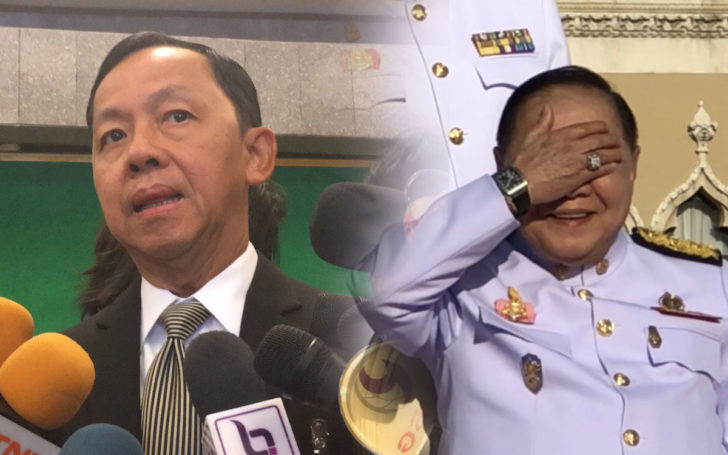A vague anti-corruption bill and influence over the National Anti-Corruption Commission make up the latest in the junta’s efforts to ‘cleanse’ Thai politics. But with corruption scandals plaguing the NCPO itself, how pure are its intentions?
The
Anti-Corruption Organisation of Thailand (ACT), a Thai elite network against corruption, has released a list of the ten most egregious corruption cases of 2017. While the cases cover malfeasance by Buddhist institutions, state enterprises and the police, the junta’s own corruption scandals top the list.
Throughout 2017, the junta’s leaders have faced repeated criticism over corruption allegations. Questions were raised over lavish watches adorning Deputy Prime Minister Prawit Wongsuwan’s wrist, and Interior Minister Gen Anupong Paojinda’s
controversial transfer of ownership over land occupied by villagers to the Red Bull empire.
Late this year, Gen Prawit faced harsh criticism over his failure to report his high-end watches to the National Anti-Corruption Commission (NACC). According to the law, politicians have to declare their assets to the NACC before and after taking a political position. Prawit’s watches were not in the list of assets he submitted prior to assuming office.
While the NACC has asked Prawit to provide an explanation to the commission by 8 January 2018, its commitment to investigating the junta is questionable since the NACC chairperson, Pol Gen Watcharapol Prasarnratchakij, is closely connected to the junta and to Gen Prawit in particular.
Only two days after the coup in 2014, the junta promoted Watcharapol to caretaker chief of the Royal Thai Police. In October 2015 the National Legislative Assembly, the junta’s appointed lawmakers, nominated him to a position on the NACC. The commission voted him to the role of chairperson in December.
The NLA’s Organic Bill on the NACC lays bare the junta’s intent to maintain power over the ‘watchdog’ institution.
After the promulgation of the 2017 Constitution, the committees of the Election Commission of Thailand and the Human Rights Commission of Thailand were to be replaced after the passing of organic laws related to their agencies.
Curiously however, the NACC, along with the Constitutional Court, has been exempt from this ‘resetting’.
Recently, the NLA also proposed to
grant the NACC the power to track the communication devices of politicians. The proposal raised concerns that the NACC will have too much power.
“I understand that those who are working want to have power, but if you hold power for too long, it will become a double-edged sword that is dangerous,” warned Constitution Drafting Committee chairperson Meechai Ruchupan, in a critique of the proposal.
On top of the attempt to increase the NACC’s power, the junta in August proposed
an anti-corruption bill to the NLA. Although the NLA is currently reviewing the bill, politicians and legal experts have already criticised the law as being littered with ambiguous terms.
The law prohibits government officials from using their positions to benefit both relatives and people “who behave like relatives”. Government officials are also prohibited from accepting any “benefits that can be counted as money”. Examples given in the law include transportation, discounts for goods that regular customers are not entitled to, and debt forgiveness.
Atukkit Sawangsuk, a political columnist,
commented that such broad terms could form the basis of judicial harassment between civil servants in competition with each other.
“Imagine that I’m from Khorat, that I’m a civil servant in Khorat. My wife is from Khorat and my wife’s family have a business … There are so many ordinary things that maybe you don’t think about [that could come under the law], like giving licenses, registration. What if I’m a Revenue Department official assessing tax? What if I’m an official who evaluates assistance for SMEs?” Atukkit asked.
He voiced concerns that officials might be forced to work outside their hometown to avoid any ‘conflicts of interest’.
On 17 August, the NLA voted to accept the bill on principle and appointed a committee to vet its details. Lawmakers may propose amendments that will hopefully clarify the bill’s ambiguities.


